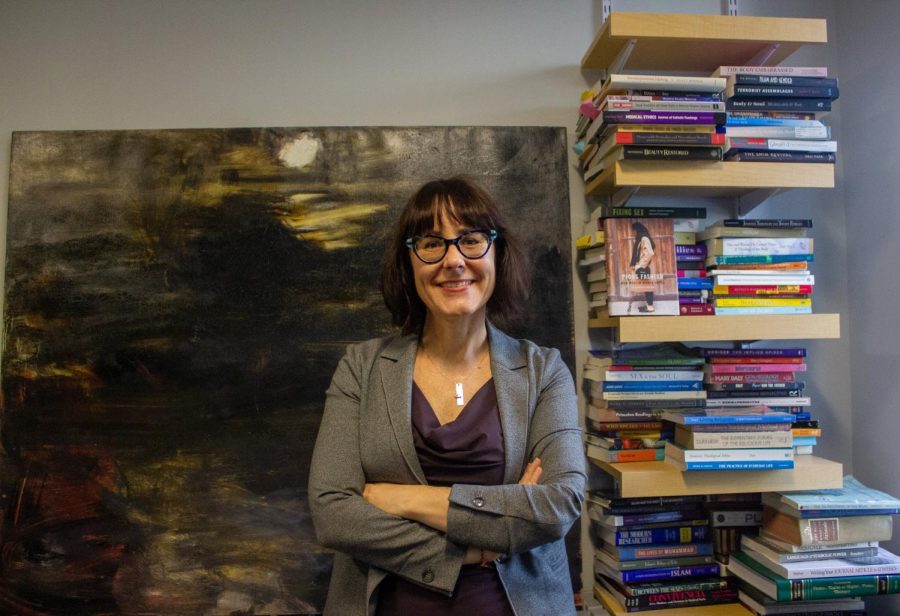NU professor Liz Bucar seeks to expand awareness and knowledge of religion in daily life
Bucar teaches courses in religion, ethics, comparative religious studies and culture studies.
October 31, 2019
It only takes three minutes of chatting with Elizabeth Bucar, a religious ethicist who studies sexuality and gender in Islamic and Christian communities, to understand her passion for what she does.
“I have the best job in the world,” said Bucar, who works as a professor of philosophy and religion at Northeastern. “I get to think and study, work with communities I’m interested in and learn from them and then teach.”
Armed with a bachelor’s degree in government from Harvard University, as well as a master’s degree in religious studies and a doctorate in religious ethics from the University of Chicago, Bucar said she wants to “contribute to a public conversation that’s already going on about religion.”
Bucar, a North Carolina native, said she did not always see herself focusing in this area.
“I myself am not religiously affiliated,” Bucar said. An early job working for a non-profit called Catholics for Choice led Bucar to observe how Catholicism played a very important part in the discourse surrounding birth control.
“If you’re interested in the conversation about abortion, you have to pay attention to Catholicism,” Bucar said. She firmly believes that religion intersects every field and that studying it will help you “see things you didn’t consider before.”
An advocate for students taking at least one religious studies class, Bucar teaches courses in religion, ethics, comparative religious studies and culture studies.
Bucar said there are misconceptions about what you can learn in a religious studies class. “Some people think it’s like Sunday school.”
Bucar emphasized that religious studies are about the practices done every day and their relevance to current society, not about dusting off old books.“Even if we did look into old books, we would think about how it impacts us today,” Bucar said.
She believes that no matter what field one pursues, be it journalism, politics, health care, nursing or immigration, they will encounter religion. She said anyone is bound to have interactions with a variety of religions and that an education in the subject can go a long way.
“Religion is always in the room, and hence, the more you know about it, the more you can navigate it,” she said.
There is a certain ignorance and illiteracy around religion, Bucar said. While she’s not trying to change the manner in which many borrow certain aspects of different religions, she wants people to “think about ways we can do that while causing less harm.”
Bucar has published three books to acclaim: “Creative Conformity: The Feminist Politics of U.S. Catholic and Iranian Shi’i Women,” “The Islamic Veil: A Beginner’s Guide” and “Pious Fashion: How Muslim Women Dress.”
She is currently working on her fourth book, on the topic of cultural appropriation. The book, entitled “Stealing Your Religion,” will be released sometime in late 2020 or early 2021.
Bucar said the book, which features case studies of specific instances of appropriation, is “very uncomfortable,” but a necessary conversation to have. She said it forces her to adopt a vulnerable and honest tone with her readers.
“I don’t mind making people uncomfortable, that’s what my job is,” Bucar said with a laugh. Her intention with the book is to slow down the conversation of appropriation, and to avoid thinking of controversies as black or white.
“I often talk about the times I messed up, because you learn the most from those,” Bucar said. She referenced mistakes she made in the past when encountering “foreign” religious traditions.
“People want to throw around the phrase ‘cultural appropriation,’ and then no one wants to say anything,” Bucar said. “Sometimes it shuts down conversation that could be very productive.”
Dedicated to expanding the discourse of religion in everyday life, Bucar continuously moves the conversation forward through her work in the classroom and in public, seen through the candid nature of her books and the articles she writes for publications such as Teen Vogue, The Atlantic and The Los Angeles Times.
Bucar is taking determined steps toward broadening the conversations around religion, and she is committed to encouraging every Northeastern student to join in.
“Religion is a beautiful mess, and if religion is messy, then America is a nation of slobs,” Bucar said.


















